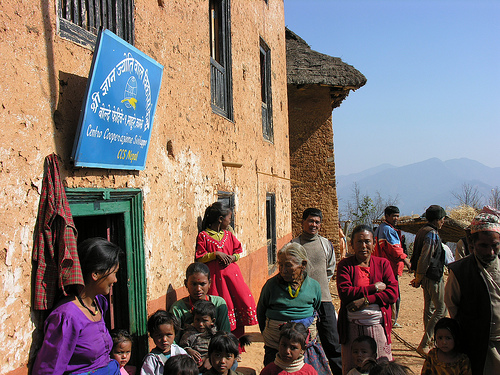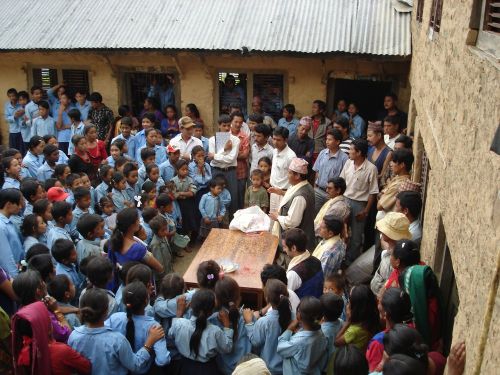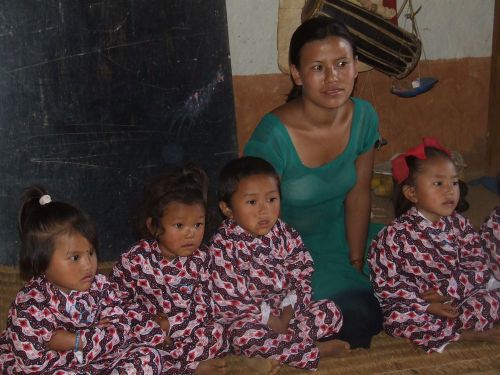 We received
We received
Dear Friends
at the end of September people of Centro Cooperazione Sviluppo INGO came to our village and we told them we dont give sponsorship letters from around 300 students because the support to secondary students, teachers, and 10+2 (high secondary) has been cut. The same happened for distribution of copy-books, pens, pencils, and other materials to all the children (around 6000) in Thimal. Some schools decided dont give letters.
We ask the italian but he told us that the responsibility of this cutting on the activities is due to the new Country Director of Centro Cooperazione Sviluppo INGO, Mrs. Chanda Rai. But this lady has never came to our village and she cannot understand our needs.
The sample is the new Children Clubs which are not very useful for our community and they were simple copied from some other INGO. Time and money used for this activities could be used to reinforce our Bal Bikas Kendra (ECDs) and to distribute materials to our children in order to alleviate the education cost burden to the poorest family.
Months ago we sent letters to Centro Cooperazione Sviluppo INGO nepal and HQ asking better management of the projects but they were without answer. Now we still ask you as local NGO always working in close cooperation with community to appeal to Centro Cooperazione Sviluppo INGO to resume these activities. You perfectly know how they gave benefits to students and family which cannot afford many money to educate children.
In faith
Saila Tamang, Dhane Bahadur Dong, Raj Magar, Krishna Mainali and others.
During the past year we asked them several times to implement all projects which have been cut from the second half of 2007, like didacticl material distributions and 10+2 support. As you know we started these projects since 2003 with full cooperation of the community, teachers, people and schools.
From 2007 many changes happened in italian Head Quarter and in nepali office, new people arrived and some activities have been cancelled. Some priority is going to be done to new projects in Kathmandu which are more easily managed by the INGO office.
Contrarily to the past, we have no voice in deciding the strategies of the INGO and they declared, also in your village, their budget declined in 2007 and 2008.
In June 2008, they published 2007 Budget on http://www.ccsit.org (in the past it was also in english now only in italian), translated it appears:
-Amount of fund collected from italian sponsors: euro 35,078,60 (-16% compared to 2006)
-Amount distributed to supported countries : euro 19, 485,82 (55,55% of total collected. In 2006 the amount was 68,81%)
-Amount used in Italy for office running expenses : euro 15,592,78 (44,45% in 2006 it was 31,19%)


-Amount for Nepal Projects and running expenses (3558 children sponsored): euro 3,563,38 (-2% compared to 2006)
-Amount used for projects (Kathmandu Chitwan, Kavre): euro 2,175, 58 (60,9%)
-Amount used for running office expenses CCS Italy IMGO: euro 1,387,80 (39,1%)


The huge increasing of administrative expenses in italian HQ and in the INGO Kathmandu Office (compared to the previous years) is due to the strategy to enlarge the number of officers (in Nepal from 4 to 22) in order to assure a better projects management. It should be noticed, around 40% of the projects budget has been spent in Kathmandu and Chitwan projects.
Of course our NGO received less than 60% of the 2006 amount and following the decisions of Centro Cooperazione Sviluppo INGO Nepal office (enlarge the office, new projects in Kathmandu, etc.) we were obliged to cut many programmed activities in spite of project agreements signed.
It is worth to note that the majority of sponsored children (around 3200) are located in Kavre but we didn’t receive an equivalent percentage of funds.
 In spite of the political crises, it seems that the SWC – Social Welfare Council (newly reformed) is operating in evaluation and monitoring INGO projects.
In spite of the political crises, it seems that the SWC – Social Welfare Council (newly reformed) is operating in evaluation and monitoring INGO projects.




















